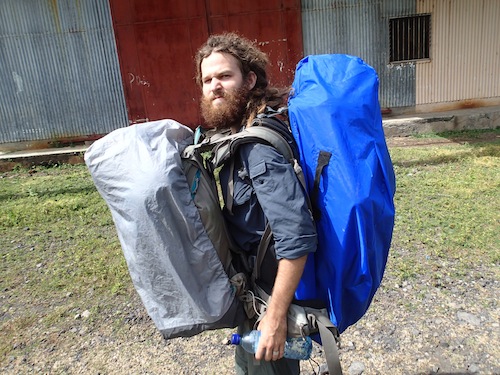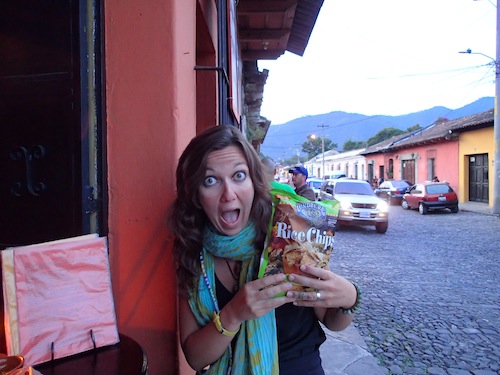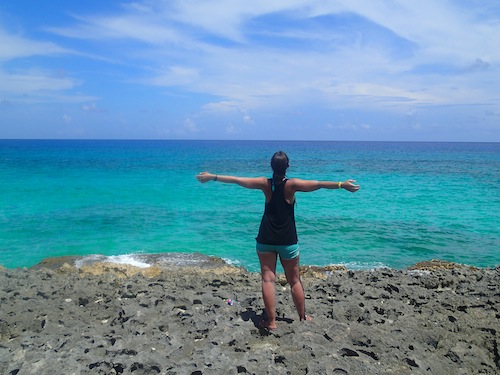“Real” travel and stereotypes
There seems to be something of a competition amongst travelers. A battle over who gets to define travel and impose said definition on the rest of the traveling masses. What does “real” travel look like? What are travelers “supposed” to do? Say? Think? Believe?
Recently I was treated to a familiar speech. A long-term traveler, complete with guitar case, backpack full of patches, full beard, and rainbow colored hat, lamented about the “walking stereotypes” disembarking from boats headed for the all things New Age in San Marcos. He shifted into high gear as he bemoaned the sorry state of Western (i.e. US) culture and scoffed at the new arrivals’ clean, and obviously new, backpacks as if such a thing were a sign of a person who should not be allowed to travel anywhere, let alone Lake Atitlan. Outwardly, I neither agreed nor disagreed with his well-rehearsed monologue but I did have to stifle a smile as I noticed that my new friend, the one busy looking down on those newly arrived “walking stereotypes”, wasn’t wearing any shoes- the most obvious and often pointed out stereotype of gringos visiting San Marcos del lago.
We are all stereotypes, us traveling folk. Every single one of us. It’s likely that we fit the bill of any number of stereotypes before we even took off. Stereotypes exist in the eye of the beholder and we are always, all the time, doing something that fits perfectly into someone else’s stereotype of who we are or where we come from. And yet, for some reason, we insist on going to battle with each other, placing our own assumptions on other travelers, and perpetuating the notion of “us” and “them” within our own little traveling community.
You’ve only been traveling for 6 months? That’s nothing. You’re not “really” traveling until you hit 6 years.
Did you see what she’s wearing? Why would anyone wear that here? (laughs) She must be on spring break.
You brought how much luggage?? Why? I’m a traveler, not a tourist, so I can survive with just a towel and a clean pair of underwear.
Why are you saying “sorry”? Good God, you must be American. Western culture is just so full of guilt! Haven’t you figured out how to let that go yet? You’re in (insert developing nation here) now!
You can’t get mad at men for treating you poorly here. (snorts) This isn’t America.
You’re going to eat that?! You should just eat a tortilla. That’s what the locals do. But then again, I guess not everyone is a “real” traveler.
Here’s the thing- we’re all just trying to figure this shit out. Sometimes some of us are sick of tortillas and just want some damn french fries. It’s not meant to be an affront to other travelers or an invitation for everyone to chime in with their opinions on whether french fry eating automatically revokes one’s “real traveler” card or not. The french fries do not necessary represent Western dominance, lack of awareness over environmental issues, or “fake” vegetarianism. You know what they do represent? French fries. Delicious, hot french fries that taste just a little bit like home after a long day.
Not every single one of us is on the same place on the path. Sometimes we’re not even not the same path. Once in a while, we aren’t even headed to the same destination. The lesson I am supposed to learn in this lifetime, is likely not the lesson you are meant to learn. This just might mean that the way we go about doing things might, just maybe, be different.
I write a lot about the fact that there is no “us” and “them” in general. It may be time travelers internalize this same concept and apply it to their own unique, vagabond community. No more “us” and “them”. No more “real travelers.” No more judgment. You cannot stake your status as a “real” traveler by looking down your nose and smugly insulting others, even if they are “new.” Some travelers eat french fries- even in Nepal. Some have brand new, clean backpacks. They will get dusty and worn soon enough, there’s no need for others to rush it.
Every single one of us, whether on the road for a week, a year, or more is just traveling the path they were meant to travel. There is no such thing as “us” and “them”, whether we are talking about the street children of India or the traveler in the dorm bunk next to ours. Many of us offer grace, empathy, and at least an attempt to understand when engaging with people in the countries and cultures we are exploring- why not off the same to our fellow travelers?




April 3rd, 2014 at 9:51 am
Well said! The kind of snobbery you describe is just another form of one upmanship–an attempt to form a pecking order based on self-created, arbitrary coolness criteria. One man’s opinion: the “coolest” people are the ones that practice the principle in your last sentence– “Many of us offer grace, empathy, and at least an attempt to understand when engaging with people in the countries and cultures we are exploring- why not offer the same to our fellow travelers?”
April 3rd, 2014 at 1:58 pm
“There are no foreign lands. It is the traveller only who is foreign.” –Robert Louis Stevenson
April 4th, 2014 at 5:50 am
YES. your post is so timely and something that’s been on my mind a lot. I received a really discouraging email from a fellow traveler recently pointing out the ways I could be a better traveler and I just thought…non-travelers don’t get emails like this about their daily routines. Why oh WHY do we travelers do this to each other?
Thank you so much for this post.
April 4th, 2014 at 10:56 am
I’ve taken to calling this the “pissing contest” aspect of independent travel culture. Even in a seemingly non-hierarchical realm like indie travel, some people can’t keep from being competitive and judgmental. This attitude has been around for a long time (and it probably always will be). I touch on this in Chapter 8 of Vagabonding:
“In reality, travel is not a social contest, and vagabonding has never represented a caste on the tourist/traveler hierarchy. Depending upon circumstance, a sincere vagabonder could variously be called a traveler or a tourist, a pilgrim or a satyr, and victor or a victim, an individual seeker or a demographic trend. Indeed, the main conceit in trying to discern travelers from tourists is that you end up with a flimsy facade of presumed insiders and outsiders. By the vacuous standards of fashion, insiders and outsiders are necessary — but in the realm of travel (where, by definition, you are always a guest in foreign places) such a distinction is ridiculous. Putting on a cocksure and superior air may win you points at a nightclub in your hometown, but such pretense on the road will only cheapen your travel experience.”
April 7th, 2014 at 9:33 pm
Excellent! I know I’ve been guilty of this at times. (I remember I just recently told my mom she looked like a tourist while she was visiting me here in Costa Rica, not a ‘real’ traveler like me). But just like Rolf mentions, I am often the tourist, camera in hand trying to ‘capture the experience’ 🙂
Miss you guys!
April 7th, 2014 at 9:46 pm
I’ve noticed that there is a competition among a lot of travelers to see who travels with the smallest budget and the most local. I understand what you mean by food. Sometimes I go to a more western place too.
April 7th, 2014 at 9:48 pm
P.S. But I am super impressed that you traveled without ANY bags. I thought I did good when I carried a tent with me through Europe for two months and just and one back pack that included camping gear and clothes. 😛
April 12th, 2014 at 10:45 pm
It’s a bit of a fine line, I think. It’s sometimes difficult for long term travelers to describe what they are doing with saying the words “real travel” or “I’m not a tourist”. The fact is that long term travelers operate pretty far out of the box most people recognize and it can be hard to come up with the right words to describe what exactly we are doing to others who are looking in and trying to understand. But at the same time it is so very important to constantly stay in touch with our words and our intentions when we engage with each other so that we can continue to connect in meaningful ways!
I love Rolf’s words on the topic because it shines a light on a very human need to “fit in” and create common community and reminds us that these needs can really turn into a less honest version of themselves when we let them take over our interactions and separate us into groups of “insiders” and “outsiders”.